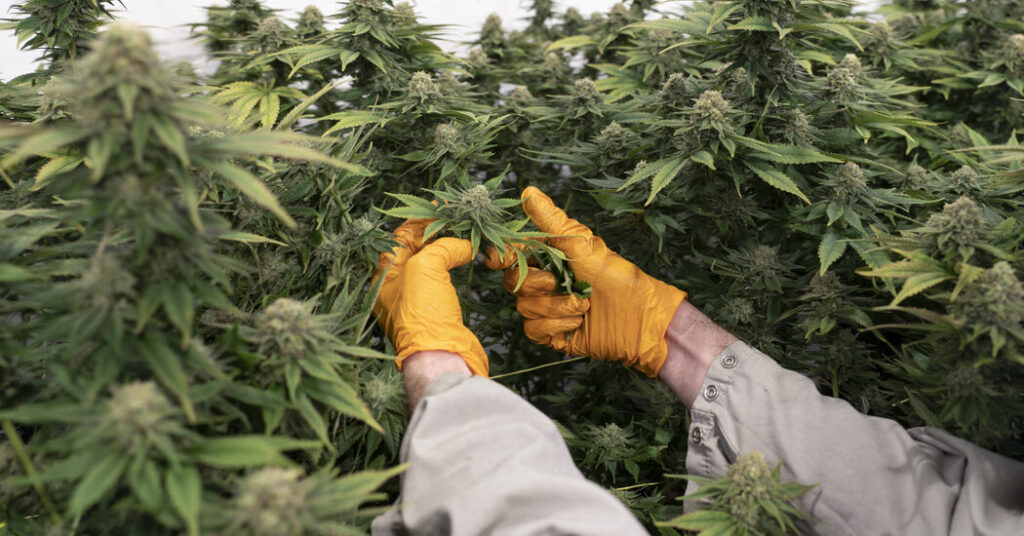Middle-aged and older adults who sought hospital or emergency room care because of cannabis use were almost twice as likely to develop dementia over the next five years, compared with similar people in the general population, a large Canadian study reported on Monday.
When compared with adults who sought care for other reasons, the risk of developing dementia was still 23 percent higher among users of cannabis, the active ingredient in marijuana, the study also found.
The study included the medical records of six million people in Ontario from 2008 to 2021. The authors accounted for health and sociodemographic differences between comparison groups, some of which play a role in cognitive decline.
The data do not reveal how much cannabis the subjects had been using, and the study does not prove that regular or heavy cannabis use plays a causal role in dementia.
But the finding does raise serious concerns that require further exploration, said Dr. Daniel T. Myran, the first author of the study, which was published in JAMA Neurology.
“Figuring out whether or not cannabis use or heavy regular chronic use causes dementia is a challenging and complicated question that you don’t answer in one study,” said Dr. Myran, an assistant professor of family medicine at University of Ottawa.
“This contributes to the literature and to a sign, or signal, of concern.”
Dr. Myran’s previous research has found that patients with cannabis use disorder died at almost three times the rate of individuals without the disorder over a five-year period. He has also reported that more cases of schizophrenia and psychosis in Canada have been linked to cannabis use disorder since the drug was legalized.
The latest study, focusing on dementia, adds to a growing body of literature on regular or heavy cannabis use and cognition. Researchers have reported impacts on verbal learning, memory and attention, while imaging studies have pointed to changes in the brain related to the use of cannabis and other substances.
Veterans with traumatic brain injuries in addition to cannabis use disorder may be at heightened risk for early-onset dementia, researchers reported last year.
But many of the studies are relatively small. The new report’s strength was its large sample and the ability to track patients over time who did not have a diagnosis of dementia when they entered the study, said Madeline Meier, an associate professor of psychology at Arizona State University, who was not involved in the study.
“They were able to rule out dementia at the time of the first cannabis visit, and were able to show the temporal order — the cannabis came first, and the dementia came second,” said Dr. Meier.
Her research, which has followed and periodically tested a cohort of over 1,000 individuals over a period of many years, has linked cannabis use and neuropsychological decline.
“I think you want to combat this whole idea that cannabis is harmless and maybe even has some medical benefits,” Dr. Meier said. “This study is showing an association that I think people should take seriously and say, ‘Maybe this is putting me at risk.’”
She noted that the work by Dr. Myran and his colleagues also found that people seeking care for alcohol use were even more likely to receive a dementia diagnosis than were cannabis users.
“I’m worried about the substance abuse in that Baby Boomer age,” she said.
More and more people, including seniors, are using cannabis. Medical visits related to cannabis increased more than fivefold among adults 45 and older between 2008 and 2021, the new study found. Among adults 65 and over, visits increased almost 27-fold.
The study included more than 6 million people age 45 and over who did not have a diagnosis of dementia at the start of the research. Of them, 16,275 had an acute-care medical encounter because of cannabis.
The patients with cannabis-related visits were compared to the matched general population, and in a separate comparison, to 140,824 matched patients who needed medical care for all other reasons.
Within five years, 5 percent of those with acute care cannabis visits received a dementia diagnosis. The figure for individuals needing care for other reasons was 3.6 percent, and for similar individuals in the general population, 1.3 percent.
But people who are heavy cannabis users differ from those who are not in a variety of ways, some of which may help explain the increased risk for dementia, Dr. Myran explained.
While some of the factors can be accounted for, he said, “you can’t control for all of them.”
Another unknown is self-medication, he said. Someone who has started experiencing symptoms of cognitive decline may be more likely to turn to cannabis. If so, then “it looks as if the cannabis is causing dementia, but it’s just on the pathway — they were already developing dementia,” Dr. Myran said.
After making adjustments for age, sex, income and other factors, including other health conditions, he and his colleagues determined that patients who sought care for cannabis-related reasons were 1.23 times as likely as those who had gotten any kind of acute care to be diagnosed with dementia, and 1.72 times as likely as those in the healthier general population.
https://www.nytimes.com/2025/04/14/health/cannabis-marijuana-dementia.html


